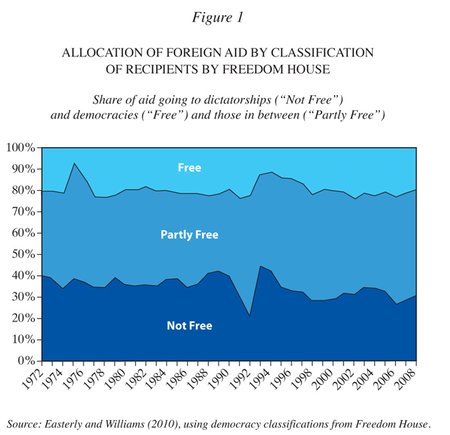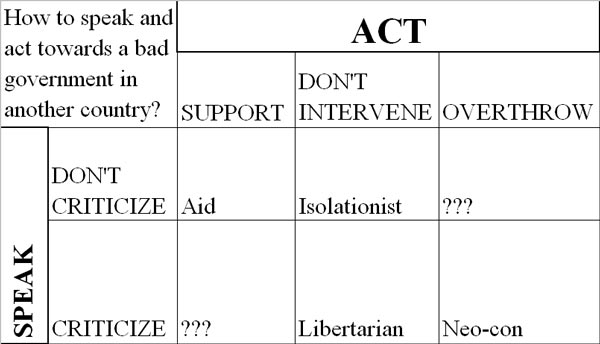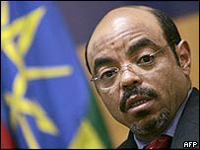UPDATE Sept 19, 8:30am (see end of post)
I have been getting a lot of email from Ethiopian-Americans who are very upset that Columbia University has invited Prime Minister Meles Zenawi to speak this coming Wednesday, like this one:
Most of the professors who come across him, in most cases are neutralized or transformed as his advocates. So far, you are the only one standing clear, so the Ethiopian people need one intellectual friend like you to make their case. Please don't be afraid and help our people and speak up.
I am both moved and extremely uncomfortable. The Ethiopian diaspora critics of Meles are upset about the support for Meles coming from Professors Sachs and Stiglitz at Columbia (note: I hear from critics in the diaspora, because its nearly impossible to be a critic from inside Ethiopia). I have criticized the Meles regime here and here (2nd one joint with Laura). But it should not be up to the faranji to conduct the debate. None of us know enough or have enough at stake to get it right.
But I am happy to give the opposition a platform in this blog, without necessarily endorsing any one viewpoint, individual, or movement. Nor do I imply that any one I quote is necessarily representing a majority of Ethiopians. I have previously given space on the blog to a supporter of Meles.
So what are the issues? The Columbia student newspaper noted how Columbia's original speech announcement had a laudatory bio of Meles (since removed), further outraging the Ethiopian opposition.
Under the seasoned governmental leadership of Prime Minister Meles Zenawi ... Ethiopia has made and continues to make progresses in many areas including in education, transportation, health and energy.
Obang Metho, the director of the Solidarity Movement for a New Ethiopia, wrote me with an alternative bio:
Electoral manipulations, harassment, intimidation,beatings, political imprisonments and the withholding of humanitarian aid for any who do not support Meles ‘ethnic-based EPRDF party, have effectively closed all political space to any opposing groups. The criminalization of dissent, advanced through new repressive laws regarding civil society and vague antiterrorism laws that could make nearly anyone guilty, have further silenced the people and the media.
Columbia University has the right to invite whomever they choose, but yet, such an invitation will only be misused to further elevate a dictator who is oppressing the people of Ethiopia.
Political science professor Alemayehu Mariam wrote an open letter to Columbia president Lee Bollinger on the Huffington Post:
There is widespread belief among Ethiopian Americans that Mr. Zenawi's invitation to speak ...necessarily implies the University's endorsement and support of Mr. Zenawi's views, policies and actions in Ethiopia. I am writing to request your office to issue an official statement clarifying your position concerning Mr. Zenawi as you so eloquently did when Mahmood Ahmadinejad of Iran spoke on your campus on September 24, 2007.
Professor Mariam cites some of the credentials of Meles Zenawi to get the Ahmadinejad treatment:
In 2005, security forces under the personal command and control of Mr. Zenawi massacred 193 unarmed protesters and inflicted severe gunshot wounds on 763 others...
In December 2008, Mr. Zenawi arrested and reinstated a life sentence on Birtukan Midekssa, the only woman political party leader in Ethiopian history. He kept her under extreme conditions in prison.
He quotes the Committee to Protect Journalists:
The government enacted harsh legislation that criminalized coverage of vaguely defined "terrorist" activities, and used administrative restrictions, criminal prosecutions, and imprisonments to induce self-censorship... The government has had a longstanding practice of bringing trumped-up criminal cases against critical journalists, leaving the charges unresolved for years as a means of intimidating the defendants... Ethiopia as the only country in sub-Saharan Africa with 'consistent' and 'substantial' filtering of web sites...
Even it's not up to the faranji to debate Ethiopia's politics, we can all certainly comment on what support is given to each side by our governments, our aid agencies, and our universities.
What do you think of Columbia's invitation to Meles? Should President Bollinger issue the "Ahmadinejad" disclaimer requested by the critics?
UPDATE (Sunday 9/19 8:30am): The same pro-Meles Ethiopian Ph.D. student cited in an earlier Aid Watch post wrote me again this morning ("you are back at it again!"):
The note you posted regarding HE PM Meles Zenawi is highly charged with hatred and grudge. It does not look one produced by a man who claims to be a scholar and neutral. Once again, you clearly demonstrated your malicious intent to harm the flourishing name of our prime minister... your witnesses are disgruntled and die hard extremists
I am very happy to feature both sides to the debate, just as I want to also provide an alternative viewpoint to the support of Meles by Professors Stiglitz and Sachs at Columbia. Unfortunately, this debate cannot happen within Ethiopia because Meles suppresses dissent, and even this very blog post is almost certainly blocked from anyone trying to access it from within Ethiopia.
 From Aid to Equality
From Aid to Equality












